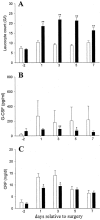Perioperative recombinant human granulocyte colony-stimulating factor (Filgrastim) treatment prevents immunoinflammatory dysfunction associated with major surgery
- PMID: 14685103
- PMCID: PMC1356195
- DOI: 10.1097/01.sla.0000103062.21049.82
Perioperative recombinant human granulocyte colony-stimulating factor (Filgrastim) treatment prevents immunoinflammatory dysfunction associated with major surgery
Abstract
Objective: To examine the effects of perioperative rhG-CSF administration on immune function in patients subjected to major surgery.
Summary background data: Severe trauma, such as major surgery, initiates acute immunodysfunction which predisposes the patient towards infectious complications.
Methods: Sixty patients undergoing elective surgery received either recombinant human granulocyte colony-stimulating factor/rh G-CSF (Filgrastim) or a placebo perioperatively. At several time points before and after the surgical intervention immunofunctional parameters were assessed. RESULTS Leukocyte counts and serum levels of anti-inflammatory mediators (IL-1ra and TNF-R) were increased in Filgrastim-treated patients, while the post-operative acute phase response was attenuated. Monocyte deactivation (reduced TNF-alpha release and HLA-DR expression) and lymphocyte anergy (impaired mitogenic proliferation and reduced TH1 lymphokine release) were blunted and the incidence and severity of infectious complications were reduced.
Conclusions: These results suggest that Filgrastim treatment reinforces innate immunity, enabling better prevention of infection. Thus, this unique combination of hematopoietic, anti-inflammatory and anti-infectious effects on the innate immune system warrants further study of clinical efficacy and sepsis prophylaxis.
Figures



Similar articles
-
How to leverage an endogenous immune defense mechanism: the example of granulocyte colony-stimulating factor.Crit Care Med. 2003 Jan;31(1 Suppl):S65-75. doi: 10.1097/00003246-200301001-00010. Crit Care Med. 2003. PMID: 12544979 Review.
-
Effects of exogenous recombinant human granulocyte colony-stimulating factor (filgrastim, rhG-CSF) on neutrophils of critically ill patients with systemic inflammatory response syndrome depend on endogenous G-CSF plasma concentrations on admission.Intensive Care Med. 2003 Jun;29(6):904-914. doi: 10.1007/s00134-003-1734-y. Epub 2003 Apr 8. Intensive Care Med. 2003. PMID: 12682721 Clinical Trial.
-
Perioperative granulocyte colony-stimulating factor does not prevent severe infections in patients undergoing esophagectomy for esophageal cancer: a randomized placebo-controlled clinical trial.Ann Surg. 2004 Jul;240(1):68-75. doi: 10.1097/01.sla.0000129705.00210.24. Ann Surg. 2004. PMID: 15213620 Free PMC article. Clinical Trial.
-
Filgrastim (RHG-CSF) related modulation of the inflammatory response in patients at risk of sepsis or with sepsis.Cytokine. 1996 Mar;8(3):260-5. doi: 10.1006/cyto.1996.0035. Cytokine. 1996. PMID: 8833041 Clinical Trial.
-
Colony-stimulating factors for the management of neutropenia in cancer patients.Drugs. 2002;62 Suppl 1:1-15. doi: 10.2165/00003495-200262001-00001. Drugs. 2002. PMID: 12479591 Review.
Cited by
-
The Early Expression of HLA-DR and CD64 Myeloid Markers Is Specifically Compartmentalized in the Blood and Lungs of Patients with Septic Shock.Mediators Inflamm. 2016;2016:3074902. doi: 10.1155/2016/3074902. Epub 2016 Jun 19. Mediators Inflamm. 2016. PMID: 27413252 Free PMC article.
-
Surgical trauma and immunosuppression: pathophysiology and potential immunomodulatory approaches.Langenbecks Arch Surg. 2005 Aug;390(4):333-41. doi: 10.1007/s00423-005-0557-4. Epub 2005 Jul 2. Langenbecks Arch Surg. 2005. PMID: 15995884 Review.
-
Pandoraea sputorum Bacteremia In A Patient Who Had Undergone Allogeneic Liver Transplantation Plus Immunosuppressive Therapy: A Case Report.Infect Drug Resist. 2019 Oct 25;12:3359-3364. doi: 10.2147/IDR.S227643. eCollection 2019. Infect Drug Resist. 2019. PMID: 31695454 Free PMC article.
-
Granulocyte-colony stimulating factor (G-CSF) and granulocyte-macrophage colony stimulating factor (GM-CSF) for sepsis: a meta-analysis.Crit Care. 2011;15(1):R58. doi: 10.1186/cc10031. Epub 2011 Feb 10. Crit Care. 2011. PMID: 21310070 Free PMC article. Review.
-
Morbidity and Mortality of Neutropenic Patients in Visceral Surgery: A Narrative Review.Cells. 2022 Oct 21;11(20):3314. doi: 10.3390/cells11203314. Cells. 2022. PMID: 36291181 Free PMC article. Review.
References
-
- Green DR, Faist E. Trauma and the immune response. Immunol Today. 1988;9:253–255. - PubMed
-
- Faist E, Schinkel C, Zimmer S. Update on the mechanisms of immune suppression of injury and immune modulation. World J Surg. 1996;20:454–459. - PubMed
-
- Schinkel C, Licht K, Zedler S, et al. Interferon-gamma modifies cytokine release in vitro by monocytes from surgical patients. J Trauma. 2001;50:321–327. - PubMed
-
- Volk HD, Reinke P, Falck P, et al. Diagnostic value of an immune monitoring program for the clinical management of immunosuppressed patients with septic complications. Clin Transplant. 1989;3:246–252.
-
- Faist E, Schinkel C, Zimmer S, et al. Inadequate interleukin-2 synthesis and interleukin-2 messenger expression following thermal and mechanical trauma in humans is caused by defective transmembrane signalling. J Trauma. 1993;34:846–853. - PubMed
Publication types
MeSH terms
Substances
LinkOut - more resources
Full Text Sources
Medical
Research Materials

